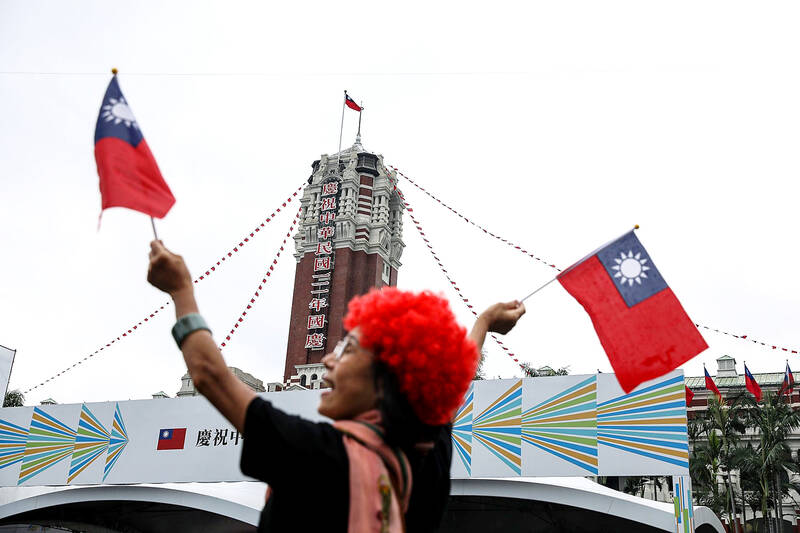Taiwan is likely to post the highest GDP per capita in East Asia, beating South Korea and Japan this year, South Korean monthly magazine BusinessKorea said in a report yesterday, citing the latest IMF estimate.
Taiwan’s GDP per capita is expected to increase to US$35,510 this year from US$33,140 last year, the report said.
That would put the nation’s GDP per capita above South Korea’s expected US$33,590 for the first time since 2003 and above Japan’s US$34,360 for the first time ever, it said.

Photo: I-Hwa Cheng, Bloomberg
South Korea’s GDP per capita is estimated to fall 4 percent this year, while that of Japan is to drop 12.6 percent from last year, the report said.
The report attributed Taiwan’s rapid GDP growth to the government’s intensive support of the local semiconductor industry.
It said Taiwan Semiconductor Manufacturing Co’s (TSMC, 台積電) sales in the third quarter were estimated to have exceeded Samsung Electronics Co’s for the first time, citing industry sources.
TSMC, the world’s largest contract chipmaker, on Friday reported a record quarterly revenue of NT$613.14 billion (US$19.23 billion) for the third quarter, up 14.79 percent from the previous quarter and an increase of 47.85 percent from a year earlier.
Market researcher IC Insights last month estimated that Samsung’s third-quarter revenue would have dropped by 19 percent to US$18.29 billion due to a slump in the memorychip industry.

MAKING WAVES: China’s maritime militia could become a nontraditional threat in war, clogging up shipping lanes to prevent US or Japanese intervention, a report said About 1,900 Chinese ships flying flags of convenience and fishing vessels that participated in China’s military exercises around Taiwan last month and in January last year have been listed for monitoring, Coast Guard Administration (CGA) Deputy Director-General Hsieh Ching-chin (謝慶欽) said yesterday. Following amendments to the Commercial Port Act (商港法) and the Law of Ships (船舶法) last month, the CGA can designate possible berthing areas or deny ports of call for vessels suspected of loitering around areas where undersea cables can be accessed, Oceans Affairs Council Minister Kuan Bi-ling (管碧玲) said. The list of suspected ships, originally 300, had risen to about

DAREDEVIL: Honnold said it had always been a dream of his to climb Taipei 101, while a Netflix producer said the skyscraper was ‘a real icon of this country’ US climber Alex Honnold yesterday took on Taiwan’s tallest building, becoming the first person to scale Taipei 101 without a rope, harness or safety net. Hundreds of spectators gathered at the base of the 101-story skyscraper to watch Honnold, 40, embark on his daredevil feat, which was also broadcast live on Netflix. Dressed in a red T-shirt and yellow custom-made climbing shoes, Honnold swiftly moved up the southeast face of the glass and steel building. At one point, he stepped onto a platform midway up to wave down at fans and onlookers who were taking photos. People watching from inside

Japan’s strategic alliance with the US would collapse if Tokyo were to turn away from a conflict in Taiwan, Japanese Prime Minister Sanae Takaichi said yesterday, but distanced herself from previous comments that suggested a possible military response in such an event. Takaichi expressed her latest views on a nationally broadcast TV program late on Monday, where an opposition party leader criticized her for igniting tensions with China with the earlier remarks. Ties between Japan and China have sunk to the worst level in years after Takaichi said in November that a hypothetical Chinese attack on Taiwan could bring about a Japanese

STREAMLINED: The dedicated funding would allow the US to transfer equipment to Taiwan when needed and order upgraded replacements for stockpiles, a source said The US House of Representatives on Thursday passed a defense appropriations bill totaling US$838.7 billion, of which US$1 billion is to be allocated to reinforcing security cooperation with Taiwan and US$150 million to replace defense articles provided to the nation. These are part of the Consolidated Appropriation Act, which the US House yesterday passed with 341 votes in favor and 88 against. The act must be passed by the US Senate before Friday next week to avoid another government shutdown. The US House Committee on Appropriations on Monday unveiled the act, saying that it allocates US$1 billion for the Taiwan Security Cooperation Initiative